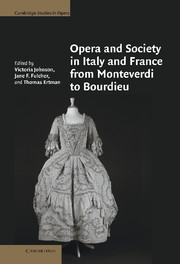Book contents
- Frontmatter
- Contents
- List of illustrations
- List of tables
- List of musical examples
- Notes on contributors
- Foreword
- Acknowledgments
- Introduction: Opera and the academic turns
- I The Representation of Social and Political Relations in Operatic Works
- Introduction to Part I
- 1 Venice's mythic empires: Truth and verisimilitude in Venetian opera
- 2 Lully's on-stage societies
- 3 Representations of le peuple in French opera, 1673–1764
- 4 Women's roles in Meyerbeer's operas: How Italian heroines are reflected in French grand opera
- 5 The effect of a bomb in the hall: The French “opera of ideas” and its cultural role in the 1920s
- II The Institutional Bases for the Production and Reception of Opera
- III Theorizing Opera and the Social
- Bibliography
- Index
2 - Lully's on-stage societies
Published online by Cambridge University Press: 22 September 2009
- Frontmatter
- Contents
- List of illustrations
- List of tables
- List of musical examples
- Notes on contributors
- Foreword
- Acknowledgments
- Introduction: Opera and the academic turns
- I The Representation of Social and Political Relations in Operatic Works
- Introduction to Part I
- 1 Venice's mythic empires: Truth and verisimilitude in Venetian opera
- 2 Lully's on-stage societies
- 3 Representations of le peuple in French opera, 1673–1764
- 4 Women's roles in Meyerbeer's operas: How Italian heroines are reflected in French grand opera
- 5 The effect of a bomb in the hall: The French “opera of ideas” and its cultural role in the 1920s
- II The Institutional Bases for the Production and Reception of Opera
- III Theorizing Opera and the Social
- Bibliography
- Index
Summary
Aside from their numerous and well-discussed musical differences, French and Italian Baroque operas depart radically from each other in their construction of on-stage societies. As a general rule, Italian operas present a small group of individuals who find themselves in unstable situations to which they seek individual resolutions. They may be rulers or generals, and the fate of thousands may depend on their actions, but their subjects or soldiers have no role within the musical world of the opera. French operas, on the other hand, bring crowds of people on stage at least once an act – singing and dancing in the most extended and musically sumptuous passages of the entire work. The protagonists function not as isolated individuals, but within societies that are visible and audible for as much as a third of each opera.
I had this difference brought forcefully to my notice recently when I saw a production of a Handel opera in which the director seemed to chafe at its restricted social world and used two methods to modify visually the string of solo utterances that composed the musical fabric of the work: introducing supernumeraries from time to time; or having any other singers who happened to be on stage engage in actions that put them into relationships with the soloist that created, however briefly, a sense of a community. But I remained struck by how different an occasional visual sign of togetherness is from the world of the crowded French stage.
- Type
- Chapter
- Information
- Publisher: Cambridge University PressPrint publication year: 2007
- 5
- Cited by



